Line-up of female candidates a cosmetic move?

A sexy 25-year old model running for a national parliamentary seat and a 24-year-old former flight stewardess-cum-beauty pageant contestant running for a local assembly seat in Aceh are among the slate of female candidates for the elections on April 9.
Their parties are banking on their celebrity status and good looks to get votes, never mind that they have no political experience.
The selection of such female candidates has raised questions about whether a requirement for women to make up three out of 10 candidates, introduced in 2012 in time for these elections, is turning out to be a cosmetic move.
Parties are resorting to recruiting celebrities and politicians' wives and relatives to meet the quota, regardless of qualifications.
In 2001, Indonesia became the first South-east Asian nation to elect a woman, Ms Megawati Sukarnoputri, as president.
Since then, other female politicians have emerged as role models, such as labour activist Rieke Diah Pitaloka of Indonesian Democratic Party-Struggle (PDI-P), Ms Nurhayati Ali Assegaf of the ruling Democratic Party and Ms Nurul Arifin of Golkar. Yet mindsets towards women in political office have yet to change.
Some noted that female politicians are also vulnerable to graft, such as jailed former beauty queen Angelina Sondakh of Democratic Party and arrested former Banten governor Ratu Atut Chosiyah from Golkar. In the current Parliament, only 18 per cent of 500 MPs are women, though that is up from 9 per cent in 1999.
"The political scene is still male-dominated and parties are not serious about having good female politicians," Ms Natalia Warat, a programme officer at the Asia Foundation, told The Straits Times. In the 2009 election, 42 per cent of women elected were heiresses of political dynasties, she noted, citing findings by the University of Indonesia's Centre for Political Studies.
Ms Nelly Armayanti, a gender studies lecturer at Medan University and a former Election Commission chief in Medan, added: "The calibre of the female candidates is still weak. Most are without vision and solid performance because they are recruited closer to the election period and usually lack enough political training."
What's more, women's issues tend to be sidelined on the political stage. In North Sumatra, for example, many women still don't know that they have access to free health coverage, such as maternity care, she said.
Ms Michelle Bekkerring, country manager of the International Republican Institute (IRI), a democracy advocacy group, said Indonesia does not lack female political talent. IRI runs a large programme in Aceh, East Nusa Tenggara, North Sumatra, South Sulawesi and West Nusa Tenggara to train women candidates to come up with campaigns that reflect the concerns of voters.
Dr Geeta Dutta, 44, a first- time candidate for National Democratic Party vying for a seat in Medan's local assembly, said women themselves have to step up. "The law has provided empowerment to women. Now, it is up to their effort to research ways to build up political awareness."

Get a copy of The Straits Times or go to straitstimes.com for more stories.